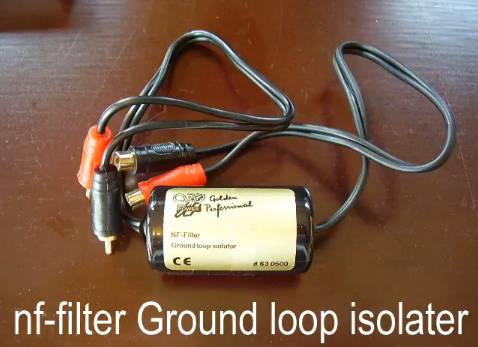Difference between revisions of "Laptop Ground Loop Noise"
m |
|||
| Line 8: | Line 8: | ||
[[Image:nf-filter_ground_loop_isolator.jpg]] | [[Image:nf-filter_ground_loop_isolator.jpg]] | ||
| + | |||
| + | By other names: | ||
| + | * NF-Filter Ground Loop Isolator | ||
| + | * Audio Ground Loop Isolator | ||
| + | * NF-Filter | ||
| + | * NF-Signal Isolator | ||
| + | * Hum Eliminator | ||
| + | * Auto NF Low Level Filter | ||
| + | * Ground Loop Isolator | ||
Ground loop noise is typically in the 50 - 60Hz range. Ground loops are perceived usually as a hum or buzz in your audio signal. They generally emerge when an electrical system (two or more electrical devices) is connected through more than one way to the electrical ground. The noise can also be generated by noisy electronic devices, and computers are notorious for producing electrical noise, also known as harmonics. | Ground loop noise is typically in the 50 - 60Hz range. Ground loops are perceived usually as a hum or buzz in your audio signal. They generally emerge when an electrical system (two or more electrical devices) is connected through more than one way to the electrical ground. The noise can also be generated by noisy electronic devices, and computers are notorious for producing electrical noise, also known as harmonics. | ||
Revision as of 20:21, 11 August 2010
This problem can occur when using a laptop onboard sound card, or USB External Audio Adapter. Mobile DJ's may use a laptop computer to provide digital audio to their mixers and amplifiers. Often there is a buzz or hum that is related to activity on the laptop. The harmonic noise can change when the screen brightness is adjusted, when the laptop is switched from AC to DC power, or general activity on the laptop such as disk access. These harmonics are a symptom of the laptop's internal electronics.
Often the ground loop noise changes pitch and intensity while the user is doing mouse work. On an ACER laptop that was tested, turning the LCD brightness all the way up to full intensity caused the noise to almost disappear. When any dimming was using the noise became very intense.
On a Dell laptop that was tested, the noise could be greatly reduced by disabling the built in LCD display and using an external monitor. This is not a practical solution for it defeats the versatility of the laptop.
An interested Youtube video "mobile dj tips remove laptop noise" explains that this noise can be eliminated by using a nf-filter ground loop isolator.
By other names:
- NF-Filter Ground Loop Isolator
- Audio Ground Loop Isolator
- NF-Filter
- NF-Signal Isolator
- Hum Eliminator
- Auto NF Low Level Filter
- Ground Loop Isolator
Ground loop noise is typically in the 50 - 60Hz range. Ground loops are perceived usually as a hum or buzz in your audio signal. They generally emerge when an electrical system (two or more electrical devices) is connected through more than one way to the electrical ground. The noise can also be generated by noisy electronic devices, and computers are notorious for producing electrical noise, also known as harmonics.
A ground loop isolator may connect inline with the line level audio connection.
There is also a noise isolator for connection between the AC power source and your audio equipment. A product called the Hum X filters out unwanted voltage and current in the ground line that cause ground loop hum while simultaneously maintaining a solid, safe ground.
